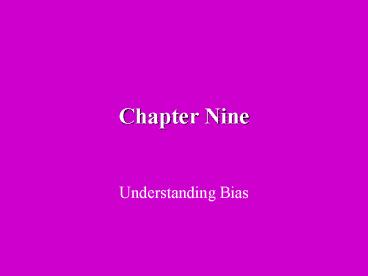Chapter Nine - PowerPoint PPT Presentation
1 / 19
Title:
Chapter Nine
Description:
Research bias may be thought of as a preference or ... Familism - treating family as unit of analysis, rather than the individual. Sources of Bias... – PowerPoint PPT presentation
Number of Views:26
Avg rating:3.0/5.0
Title: Chapter Nine
1
Chapter Nine
- Understanding Bias
2
The Nature of Bias
- Research bias may be thought of as a preference
or predisposition to favour a particular outcome
thus indicating a systematic distortion of
research conclusions - Typically the distortions are inadvertent, but
they can also be intentional - If bias is not addressed ina study, the
reliability of findings is considered suspect
3
Bias in Quantitative Research
- Bias implies there is an unknown truth waiting to
be described - In quantitative designs the approach suggests
that the researcher knows the truth simply
wants to confirm his/her knowledge - eg. Questionnaire responses reflect the
researchers previous knowledge, values, etc.
4
Bias in Qualitative Research
- In qualitative research the researcher is an
integral part of the research design the
participants world - To minimize bias in qualitative designs the
researcher incorporates it into the design by - bracketing
- audit trail
- selecting unfamiliar participants
- selecting a topic that is not too close to the
researcher on a personal level
5
Triple Biases Nursing, Science, Culture...
- We take our nursing predispositions with us to
our research projects - We tend to seek corroboration of our
preconceptions, helps to make sense of a
complicated world, reaffirms our pet theories - Science itself potentially blinds researchers
because of the expectations of findings, the
belief in certain theories. Like culture, science
produces blinders
6
Sexism A Form of Bias
- Sexism is discrimination on the basis of gender
- RCTs used mainly by medicine have made women
victims of this approach, studying women mainly
as objects, ignoring their needs experiences
7
Types of Sexism in Research
- Androcentricity (male perspective)-based on
individualism, materialism, competitiveness -
in contrast to the views of women, ethnic groups,
the poor who focus on family concerns rather
than themselves - Overgeneralization overspecificity
- Gender Insensitivity
- Familism - treating family as unit of analysis,
rather than the individual
8
Sources of Bias...
- need to design studies to systematically test
alternative explanations - researcher affect refers to the bias that results
from a researcher having fallen in love with some
pet theory or explanation
9
Bias Selection of Problem
- Some things judged more important by funding
agencies, ones discipline peers - bias is toward the conventional, standard
projects the selection of variables
conventionally considered important the
exclusion of those conventionally considered
unimportant - probably still a bias toward quantitative
approaches
10
Bias Sampling Design
- results may be distorted by choosing to study
sub-populations with known slants - attitudes toward abortion in an urban community
with a free standing abortion clinic vs rural
communities - bias is problematic in studies where the sample
self-selects to participate
11
Bias Funding
- SSHRC main funding for social science research
- special funding available in hot areas
- traditional areas better funding
- NSERC and CIHR are better funded
- research in a social context
12
Bias Data Collection
- Experimenter effect reference is to the
influence of experimenter preferences and
expectations - Robert Rosenthal the smart rats study.
- Clever Hans
- Expectancy
- Demand characteristics
13
Bias Data Analysis
- Coding Errors
- Random Error
- Systematic Error
- Data Massaging
- Hunting
14
Bias Reporting of Findings
- T.D. Sterling, 1959, 1995. Notes the problem of
journals publishing only statistically
significant findings.
15
Bias Funding
- Possibility of funding agencies to determine what
is important to know have they got it right? - Problems of emerging disciplines in competing
with established ones
16
Advocacy Versus Pure Research
- P. 313.
- Mainstream research supportive of established
interests in society. Is there a legitimate
place to support the interests of minorities,
women, people with disabilities, the working
poor, the homeless
17
Rules for Minimizing Bias
- Education
- Avoid Sexism
- Advocacy or Explanation?
- Descriptive Accuracy
- Let disconfirmation be your guide
- Policy Recommendations are Value Based
- Be skeptical of Research Findings
18
Rules Cont
- Read Literature Cautiously, Skeptically
- Distinguish Advocacy from Pure Research
- Use Theory to Generate Testable Hypotheses
- Be Sensitive to your own outcome preferences
- Do not disclose hypotheses to subjects or
assistants
19
Rules Cont.
- Be Accepting of All Responses
- Specify Data Analysis Procedures in Advance
- Check for Random Systematic Errors
- Report any Data Massaging































